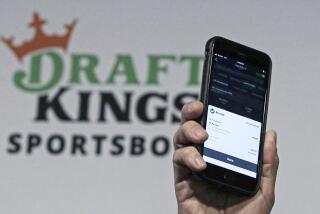In England, Athlete Betting on Himself Is Part of the Game
LONDON — Ugly scenes of violence were erupting around him. Rampaging hooligans had forced the England-Ireland soccer game to be abandoned after 27 minutes.
Yet, as he walked off the field at Dublin’s Lansdowne Road stadium, David Kelly had but one thing on his mind.
“What are the bookies going to do?” the Irish forward said to no one in particular.
Before the game, Kelly had arranged a $80 bet with a London bookmaker at odds of 9-1 that he would score the first goal of the game. He then took to the field and made himself a winner by putting the ball in the England net in the 22nd minute.
“I just fancied myself to score the first goal,” said Kelly, who collected his 450 pounds ($720) in winnings even though the match was never completed. “I had a feeling.”
“Betting on myself to score the first goal, I don’t see anything wrong with it,” Kelly said. “The way I see it, if you’re not breaking any rules, then it’s OK.”
If this were any major sport in America, Kelly--a 14-year veteran who plays in the English league for Wolverhampton--would be banned and ostracized for gambling on his own sport.
In England, no one blinked an eye.
“The whole gambling scene here is so much greater than anything at home,” said Seattle native Kasey Keller, goalkeeper for London club Millwall and one of the most prominent U.S. players in England. “It’s so much more in the culture here.”
Most main streets have at least one--if not two or three--betting parlors. There are even betting shops inside the stadiums of some soccer stadiums--an unthinkable arrangement in the United States.
At some games, when a goal is scored, the public address announcer will give the name of the scorer, the time of the goal--and the odds on that player scoring it.
While the English Football Association says that a player could be charged with misconduct for betting on the sport, it’s a rule that is rarely enforced. The practice has become so widespread that Keller can never be quite sure where a teammate’s loyalty lies.
“I have seen situations which I haven’t enjoyed too much,” Keller said. “Like a player who’s bet on himself in the past--we don’t know if he’s done it this time--but someone would be running beside him and he could pass around the goalkeeper for an easy chance to score and instead he shoots it himself.”
Such concerns have taken on a new magnitude this season, as police investigate match-fixing allegations made against Southampton goalkeeper Bruce Grobbelaar and two other Premier League players. Abroad, bribery scandals in Malaysia and at the World Youth Championship in Qatar also tarnished the sport’s image.
Kelly, however, scoffs at the notion that sport is losing its credibility because of its attitude toward gambling. He says he knows knows of no player who puts personal glory ahead of the team’s because of a bet.
“That never happens,” Kelly said. “When you’re out there in the middle of a game, you don’t have time to think, ‘Well, I’ve got 10 quid (pounds) on myself to score the first goal, I’d better not pass.’ You don’t have time to think about things like that.”
“People think that the sport in general is rife with corruption and bribery and nothing could be further from the truth. It’s not a quarter as bad as people say,” Kelly said. “With Grobbelaar, the situation is that nothing has been proven. He’s innocent until proven guilty.”
Indeed, the idea of player betting is usually portrayed in England as nothing more than harmless fun, an idea best exemplified by an incident in 1981 when two Australian cricket players actually bet against their own team in a Test match against England.
With Australia far ahead, Dennis Lillee and Rodney Marsh put money on England at 500-1, then proceeded to take part in one of the greatest collapses in cricket history. England won, and--incredibly--no action was taken against either of the betting Australians. The only repercussion, according to a respected cricket encyclopedia, was that Lillee and Marsh’s action “offended the purists.”
Lille and Marsh would probably not get off so lightly today, especially in light of recent cricket bribery scandals involving Pakistani players.
Soccer, also, is beginning to take a closer look at itself. Last month, the FA sent a letter to all its teams reminding them that player betting is technically against the rules.
“It was as much to protect the players as anything,” FA spokeswoman Clare Tomlinson said. “Betting has become topical, and we wanted to remind the players the best way to stay out of trouble is not to bet.”
Keller says his teammates have started bringing up the subject in the locker room.
“With the latest bribery scandals to hit England, a lot of players have asked me about American sports, and I say I haven’t noticed anything like it there,” Keller said. “When I explain to them that you can be kicked out the game for life for even betting on a friend’s team, they have a hard time believing it. Of course, it’d be silly to offer an NBA player $25,000 to throw a game when he’s making $3 million.”






